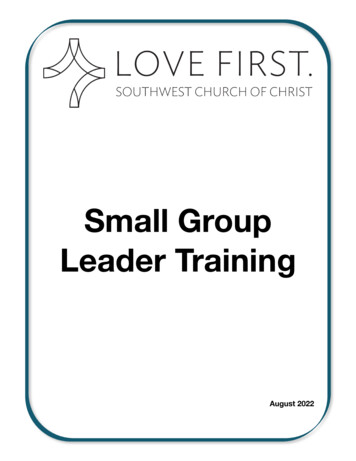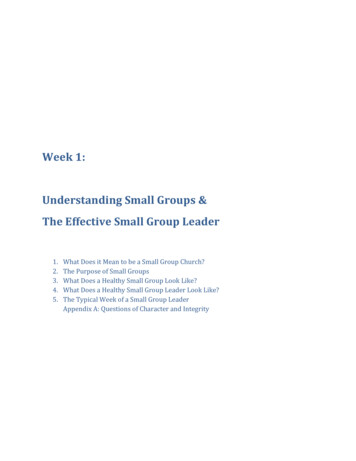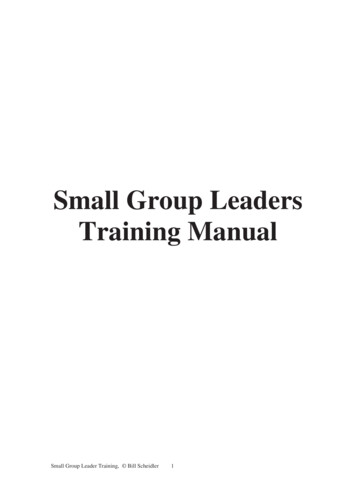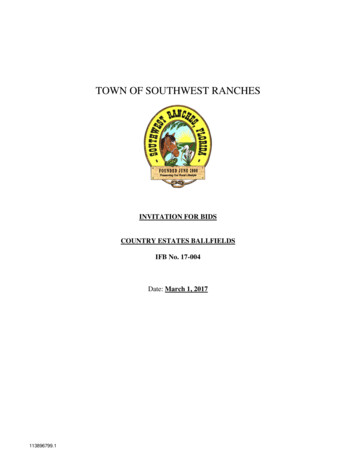
Transcription
Small GroupLeader TrainingAugust 2022
Small Group Leader TrainingHow have Small Groups been important to your faith?Church family is meaningless if it doesn’t help me when I’m hurting. support me in becoming more like Jesus.God is relational—He is“a community.”We’re made in Hisimage, so we’re hardwired for relationship.He’s always beenshaping “a people.”Small Group Ministry Vision:To create a movement of healthy small groupswhich make disciples through relationships.Contribute to the Movement (Matthew 9:37-38): Pray for God to send us more Leaders. Raise up new leaders and give them opportunities to practice. Intentionally choose a 2-year life cycle for your group while casting avision for the creation of more groups upon your conclusion. What role will you play in the larger movement? What role will your group play in the larger movement?Spiritual community isessential for a healthy,growing faith.1
Small Group Leader TrainingAnnual Rhythms August is Leader Training and Preparation September is reGroup: annual church-wide kickoff September — December (break for Christmas holidays) January — May (break for June-July) Quarterly Leader LuncheonsLeader Luncheon: aquarterly gathering ofFacilitators, Cofacilitators, Hosts, andpotential leaders forinspiration, training, andcoaching.LeaderLuncheon:aSundaysfrom 12-2pmquarterlyofFree lunchgathering& childcareall Small Group Leadersfor inspiration, training,and coaching.Sundays: noon—2pmFree lunchA Facilitator—byFree childcaredefinition—does not doall of the work. Rather,the “work” of aFacilitator is to makesure the group isaccomplishing all that isneeded.Leadership Expectations:Role 1: Facilitator Commit to lead the group for one school year. Be a champion for the pastoral care of your group. Pray for your group. Be responsible to facilitate and guard the environment of your group. Work to grow as a leader and to develop additional leaders. Attend quarterly Leader Luncheons.Role 2: Co-Facilitator Commit to lead the group for one school year. Be a champion for the pastoral care of your group. Pray for your group. Support the Facilitator of your group—be an ally. Work to grow as a leader and to develop other leaders. Attend quarterly Leader Luncheons.Role 3: Host Commit to host the group for one school year. Be a champion for the pastoral care of your group. Pray for your group. Provide a clean, safe, and welcoming environment for groupgatherings. If your group meets in a public space, make all necessaryreservations. Secure at least one alternative meeting location. Coordinate snacks and drinks. Attend quarterly Leader Luncheons.2
Small Group Leader TrainingCreating a CultureYour primary purpose as a Group Leader is to create and maintain an environment of spiritualgrowth. Such an environment is found through a balance of community and discipleship. (Thismatrix is from “Building a Discipling Culture,” by Mike Breen and Steve Cockram.)God is the One who transforms us.Our role is to make ourselvesavailable for His transforming work.3
Small Group Leader TrainingCommunity Made for Relationships / God is making a people Theology: We were created for relationship. Implications: Get real or go home. A culture of neediness is the prerequisite to a culture of love.Which practices can cultivate community?“Christianity isincredibly personal, butit cannot be private.”—Dietrich Bonhoeffer“The expression ofneediness in thecommunity allowed theeconomy of love toflow.”—Richard BeckDiscipleship Spiritual Growth / Life Change / Challenge Theology: We are to become more like Jesus—dying to our old selfand being transformed into our new self. Implications: Next-Step Culture—we’re all on a journey oftransformation and we’re usually at different places along the journey.Which practices can cultivate discipleship?Consider letting yourgroup speak into thegoals and activities youchoose. Their opinionscan help you make adecision withconfidence. At thesame time, your groupmight say “whatever.”In this case, make adecision and go for it!4
Small Group Leader TrainingRaising the Spiritual BarIt’s easy to slip into a Cozy Culture. Here are some ideas for raising thespiritual bar, because this is the Facilitator’s job! Agree as a group to get back to purpose; then brainstorm optionstogether so that everyone feels ownership. Split up by gender more frequently and use more probing questionsof accountability. Consider diving more deeply into a Missional Opportunity—something that will truly “cost” everyone. Pick a spiritual study which requires outside homework. Pick a new spiritual discipline to try and report back to each othereach week (Spiritual Practice Plan Resource). Take turns sharing your journeys of loss and grief. Participate in a catalyst event together, such as Marriage Strong,Equip/Send, a Prayer Retreat, Mission Trip, etc. Dissolve the group in order to allow two or more new groups to beborn in its place.Missional Practices Find ways to serve others beyond the Southwest church. Use non-church spaces—joining God’s work in the world. Use group meetings to plan. An updated list of service options is available online.Notes:5
Small Group Leader TrainingSeasons & SemestersSeasons of life help us consider our focus. Do we have youngchildren or young believers among us? How might God be shapingus as a group this year? How much time do we need to spend inservice to others? In what ways are we to engage our neighbors andco-workers?Semesters are filled with intentional activities. Suggestion: Use onegroup meeting to plan the semester, delegate responsibilities, andpray. Step 1: fill in holidays & special events (like the super bowl).Step 2: fill in the church calendar. Step 3: fill in your practices.Planning your semesterout at the beginningallows guests to beinvited to appropriateactivities with adequatenotice. Inviting aneighbor or co-workerto a meal or serviceactivity is lessintimidating than a Biblestudy.DateActivitySept 11Sept 18Sept 25Oct 2Oct 9Oct 16Oct 23Oct 30Nov 6Nov 13Nov 20Nov 27Dec 4Dec 11Dec 18Dec 256Point Person
Small Group Leader TrainingFacilitating a Group Spiritual ConversationGoals:1. Lots of on-topic sharing.2. Plenty of time for discussing application.Conversation Flowchart:1. Framing: words of orientation and expectation help set the tone, setboundaries, and increase participation.2. Icebreaker: a light question making it easy for everyone to answer.3. Observe: hearing a scripture and/or Kingdom truth.4. Interpret: discussing what this Kingdom truth teaches us.5. Apply: sharing what this Kingdom truth means for me.Notes:Icebreakers: If you could participate in any Olympic sport, which would you choose? What’s the worst job you’ve ever had? Who is one of your favorite authors and why? If you have 1000 dollars today for whatever you wanted, how would youspend it? Share about a time when you Are you a morning person or a night owl, and what’s that like for you? What intrigues you or frightens you about a study of the Holy Spirit? Think of someone you admire. How do you hope to become like them? What’s your dream job? What’s your favorite holiday and why?Observe: watch your video or read the passage of scripture you’re studying.Consider having the passage read by several people from multipletranslations.Interpret through Story, Love, and Wisdom: Where does this fit in the larger Story? How does this call us to love? How does this challenge us to search for Wisdom? How does this point to Jesus? What does this passage teach us about God? About humanity? What might this passage mean?Application: I / me / my statements What’s been your experience with this? If this were true, what about you would have to change? What makes this difficult for you? How might God be calling you to grow in this, and how can we help youtake that step?Other good questions to askabout a passage of scriptureor a Kingdom truth:-what stood out to you?-what bothers you?-what else do you wish weknew?A Small Groups whichneglects to discussapplication is no differentthan a class. Taking thetime to converse about howour faith connects to oureveryday experience is whatmakes a Small Groupunique!7
Small Group Leader TrainingNotes:Conversation Tips Use open-ended questions (what, how, in what ways). Use open language like “might,” “maybe,” and “what if.” No one has all ofthe answers. Tones of certainty can shut down the conversation, whiletones of possibilities will increase the conversation. Don’t ask questions with obvious answers. Make statements about theeasy stuff and get to the harder questions more quickly. Create momentum with cues such as “Thanks for sharing. Someone else,how would you answer the question?” Allow silence. Get comfortable with silence. People are thinking. Invite dissenting opinions. If the first three people who answer are all oflike-mind, it can be intimidating for someone who feels differently to speakup. Invite their voice, because the group needs it. If someone asks a good question, put it back to the group before answeringit yourself. You are the Facilitator, not the Teacher. Don’t allow group members to “fix” each other. If someone shares astruggle, we want to ask questions rather than give shallow answers.Questions like:§ tell me more§ where do you think this comes from§ what are you afraid of§ where might God be in this§ how can we be helpful to you in this struggleNotes:Pastoral Care Be a good listener. Resist the urge to offer suggestions and advice. Askhow the group can be helpful rather than assuming you already know. Always assume confidentiality and ask permission before sharing the needsof others. Address confidentiality with your group. If someone in your group of the opposite sex has a pastoral concern toshare with you, be sure to include your spouse or at least one other coleader in the conversation. With permission, share pastoral concerns with a Minister or Elder so we canbetter support everyone involved. Pray for the people in your group and stay in touch with them. Remember,you are a minister! Be sure to celebrate good things together as much as you struggle throughdifficulties together. Work to address spiritual needs more than physical needs.8
Small Group Leader TrainingHospitality—what’s the essence of hospitality?Suggestions to Avoid Cancelling Life happens—people will miss and you will miss. This is to be expected. Our desire is for cancellations to be rare. Holidays are the exception: feel free to break for holidays, but not more thantwo weeks. Backup Plan Suggestions:§ Alternate host site§ Alternate conversation leader§ Alternate activity (game night, share/prayer)§ Last resort: meal together for whomever is available§ Cancel with great anguish, tears, and regret!Notes:Leadership Wisdom Lead by example. Set clear expectations, repeat them often; share about what’s coming up. Be time sensitive. Be inclusive. Develop co-leaders and bring them with you to the Leader Luncheons andto Leader Training.Additional Resources (see following pages) Children in Groups Spiritual Growth Catalyst Options Spiritual Self-check Semester Spiritual Practice Plan9
Small Group Leader Training10
Small Group Leader Training 2 Co-Facilitator: Commit to lead the group for one school year. Be a champion for the pastoral care of your group. Support the Facilitator of your group. o Encouragement o Helping as needed Work to grow as a leader Attend quarterly Leader Luncheons Host / Hostess:










